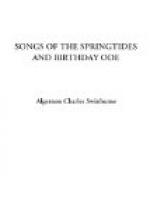For love the high song taught him: love that
turns
God’s heart toward man as man’s to Godward;
love
That life and death and life are fashioned of,
From the first breath that burns
Half kindled on the flowerlike yeanling’s lip,
So light and faint that life seems like to slip,
To that yet weaklier drawn
When sunset dies of night’s devouring dawn.
But the man dying not wholly as all men dies
If aught be left of his in live men’s eyes
Out of the dawnless dark of death to rise;
If aught of deed or word
Be seen for all time or of all time heard.
Love, that though body and soul were overthrown
Should live for love’s sake of itself alone,
Though spirit and flesh were one thing doomed and
dead,
Not wholly annihilated.
Seeing even the hoariest ash-flake that the pyre
Drops, and forgets the thing was once afire
And gave its heart to feed the pile’s full flame
Till its own heart its own heat overcame,
Outlives its own life, though by scarce a span,
As such men dying outlive themselves in man,
Outlive themselves for ever; if the heat
Outburn the heart that kindled it, the sweet
Outlast the flower whose soul it was, and flit
Forth of the body of it
Into some new shape of a strange perfume
More potent than its light live spirit of bloom,
How shall not something of that soul relive,
That only soul that had such gifts to give
As lighten something even of all men’s doom
Even from the labouring womb
Even to the seal set on the unopening tomb?
And these the loving light of song and love
Shall wrap and lap round and impend above,
Imperishable; and all springs born illume
Their sleep with brighter thoughts than wake the dove
To music, when the hillside winds resume
The marriage-song of heather-flower and broom
And all the joy thereof.
And hate the song too taught him: hate of all
That brings or holds in thrall
Of spirit or flesh, free-born ere God began,
The holy body and sacred soul of man.
And wheresoever a curse was or a chain,
A throne for torment or a crown for bane
Rose, moulded out of poor men’s molten pain,
There, said he, should man’s heaviest hate be
set
Inexorably, to faint not or forget
Till the last warmth bled forth of the last vein
In flesh that none should call a king’s again,
Seeing wolves and dogs and birds that plague-strike
air
Leave the last bone of all the carrion bare.
And hope the high song taught him: hope whose
eyes
Can sound the seas unsoundable, the skies
Inaccessible of eyesight; that can see
What earth beholds not, hear what wind and sea
Hear not, and speak what all these crying in one
Can speak not to the sun.
For in her sovereign eyelight all things are
Clear as the closest seen and kindlier star
That marries morn and even and winter and spring
With one love’s golden ring.




